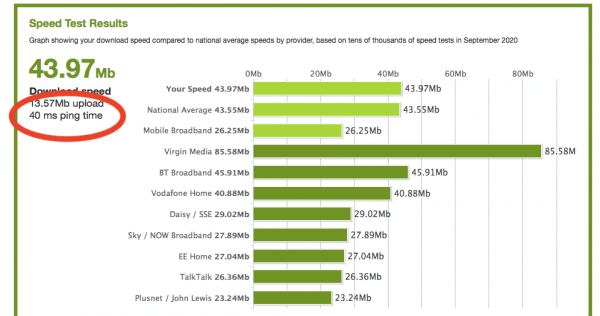
While we always do our best to guide you towards your perfect broadband deal in a jargon-free way, you cannot avoid bumping up against technical terms from time to time.
One such example is latency, a hidden spec that broadband providers don't advertise, but which can make even a lightning fast internet connection feel slow.
Put simply, latency is a measurement of the time it takes to send data and receive a response. If you think of your broadband speed as being like the top speed of a car, then it's latency is more like how long it takes to get the car moving when you first start the ignition and push down the accelerator pedal. And, although it's recorded in milliseconds, this delay can happen every time you send or request new information from the internet, which can quickly add up.
Often called the ping rate or ping time, latency affects everything you do online. Like when you're filling in an online form and there's a lag between you tapping the keyboard and your words appearing on screen. Or when you click a link and the lack of an immediate response leaves you wondering if you need to click it again.
The net result is that high latency leaves even fast internet connections feeling a lot slower and less responsive than they should do. It doesn't affect the speed itself - you can still stream a Netflix movie in 4K, but all the button presses you need to queue up the movie in the first place could be the digital equivalent of wading through mud.
Latency is most often discussed in relation to online gaming: it's the delay between pressing a button on your gamepad and seeing the resulting action on screen. It's especially important for multiplayer gaming. If you've got a higher latency connection than your opponent it's going to be like you've got much slower reactions. It puts you at a real disadvantage, and if it's too bad you can even get kicked out of a game.
In fact, for gamers, latency is a bigger problem than a slow connection. Online gaming doesn't actually need that much bandwidth, so you can get away with gaming on slow broadband as long as your ping time is good enough.
And latency is affecting many more people today, as we spend more and more time in video conferences, for work, education, social and family gatherings. Your latency could be affecting how long the delays are between what you say and what everyone else in the meeting or hangout hears. Your high latency could be the reason why you end up talking over other people, or why they're talking over you. It could making Zoom, Teams or Meet more awkward than it needs to be.
How can you improve latency?
So what does this mean for you? How do you measure latency, and is there anything you can do about it? Part of the problem is that broadband suppliers cannot guarantee a certain performance level because there are too many factors that affect it.
You're most likely to experience high latency when there are high traffic levels on the network. Ofcom research showed that latency increased by 2% in March as a result of the surge in internet usage at the start of the lockdown. You might generally find it's worse during peak hours, which are mostly during the evening.
High latency can be caused by a fault somewhere on the network. It can happen if the website or service you're connecting to is busy, or if there's a lot of traffic on your own router. Things like Wi-Fi extenders, used to improve the wireless throughout your house, can increase latency a little.
It can also be a factor of the type of internet you're using. So, full fibre is likely to be better than fibre-to-the-home, which is better than an old standard connection that runs fully on copper cables. Niche broadband services for rural users - like satellite broadband - will have the highest latency of all.
You can find out how your own broadband connection is doing by using our Speed Test tool. It only takes a few seconds, just run the test, and you'll see the results - your download and upload speeds, plus your ping time, in milliseconds. Ideally, you'll be in the region of 50ms or less; 100ms is the point where you might start to notice it; and 150ms or more could cause you problems, and might even make online gaming impossible.
What can you do about it? To be honest, not that much, since the problem will often be with your service, not with you. But there are some things you can try.
A wired connection should have a lower ping rate than a wireless one. If that isn't an option, check that you've got a good Wi-Fi signal and that your router is set up properly. You could also consider upgrading to a newer, better router. If you've got a large number of devices connected, you could try removing a few that you aren't using.
If the problem keeps on, or gets too bad, speak to your broadband provider to see if there's a problem on their end that they can fix.
For more information, check out our guide to broadband for gamers. To upgrade to a better internet service, take a look at the best broadband deals available right now or use our postcode checker to see what's available where you live.
Posted by Andy Betts on in Features
